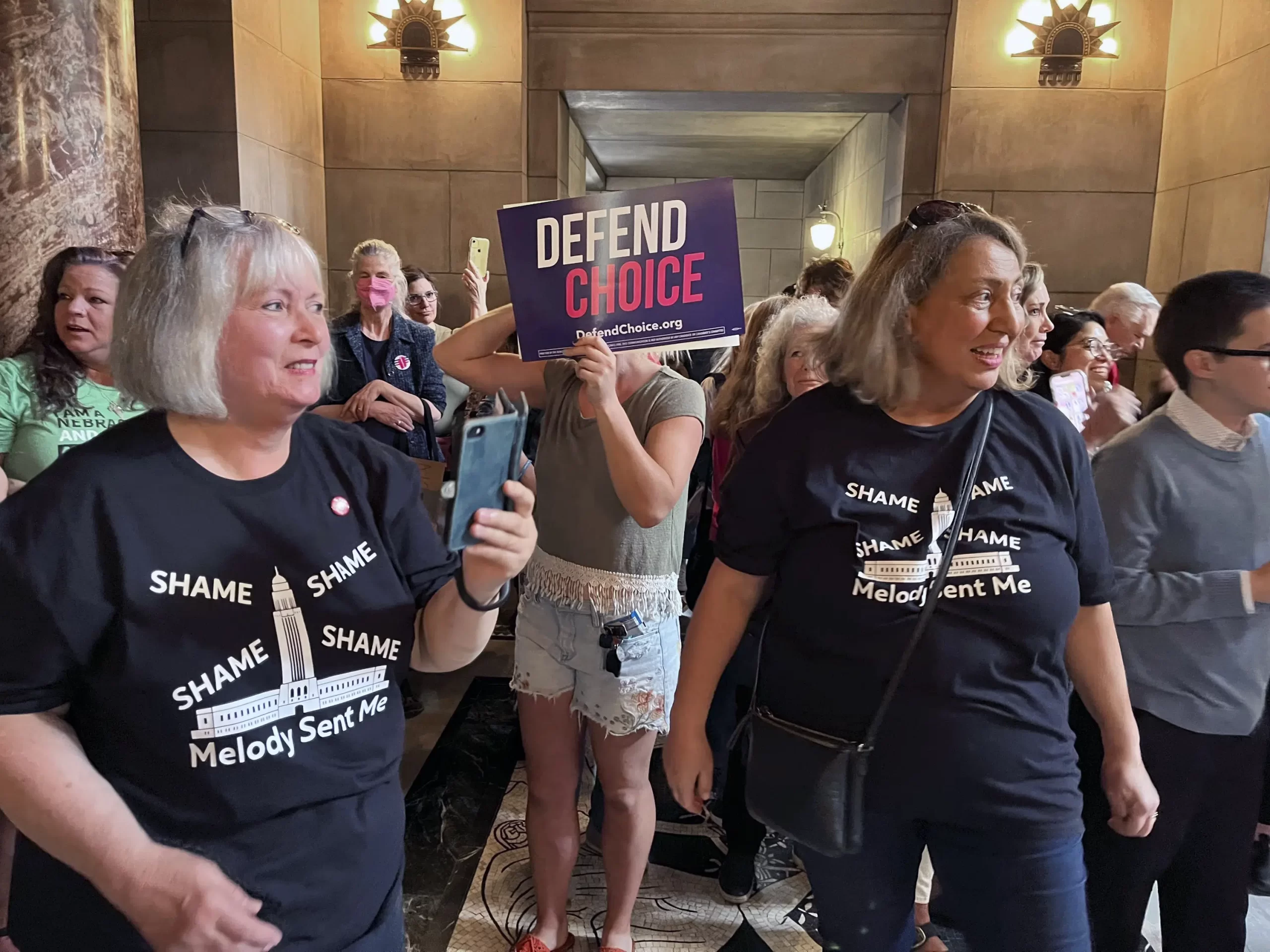
LINCOLN, Neb. (AP) — Abortion bans in Nebraska and South Carolina fell short of advancing in close votes amid heated debates among Republicans, confounding conservatives who have dominated both legislatures and further exposing the chasm on the issue of abortion within the GOP.
In Nebraska, where abortion is banned after 20 weeks of pregnancy, an effort to ban abortion at about the sixth week of pregnancy fell one vote short of breaking a filibuster. Cheers erupted outside the legislative chamber as the last vote was cast, with opponents of the bill waving signs and chanting, “Whose house? Our house!”
In South Carolina, lawmakers voted 22-21 to shelve a near-total abortion ban for the rest of the year. Republican Sen. Sandy Senn criticized Majority Leader Shane Massey for repeatedly “taking us off a cliff on abortion.”
“The only thing that we can do when you all, you men in the chamber, metaphorically keep slapping women by raising abortion again and again and again, is for us to slap you back with our words,” she said.
The Nebraska proposal, backed by Republican Gov. Jim Pillen, is unlikely to move forward this year. And in South Carolina, where abortion remains legal through 22 weeks of pregnancy, the vote marked the third time a near-total abortion ban has failed in the Republican-led Senate chamber since the U.S. Supreme Court reversed Roe v. Wade last summer.
Katie Glenn, the state policy director for Susan B. Anthony Pro-Life America, characterized the failure of both proposed abortion bans as disappointing.
“It’s a sign that legislating is hard, and there’s a lot of pieces and parts that all have to come together,” Glenn said.
The bans’ staunchest supporters have promised political retribution.
Since the fall of Roe, both states have become regional havens of sorts as they’ve watched neighboring states enact stricter abortion bans. Conservative lawmakers have bitterly made that observation in Nebraska, which has a long history as a leader in abortion restrictions. In 2010, it was the first state in the nation to ban abortion after 20 weeks of pregnancy.
Most aggravating to some Republicans is that the pushback is coming from inside the house. The Nebraska bill on Thursday failed when Republican Sen. Merv Riepe, an 80-year-old former hospital administrator, refused to give it the crucial 33rd vote needed to advance. Riepe was an original co-signer of the bill but later expressed concern that a six-week ban might not give women enough time to know they were pregnant.
When his fellow Republicans rejected an amendment he offered to extend the proposed ban to 12 weeks and add an exception for fatal fetal anomalies, Riepe pointed to his own election last year against a Democrat who made abortion rights central to her campaign. His margin of victory dropped from 27 percentage points in the May primary election, which occurred before the fall of Roe, to under 5 percentage points in the general election.
“Had my opponent had more time, more money, and more name recognition, she could have won. This made the message clear to me how critical abortion will be in 2024,” he said. “We must embrace the future of reproductive rights.”
Riepe and some Republicans across the country have noted evidence pointing to abortion bans as unpopular with a majority of Americans. An AP VoteCast nationwide survey of the 2022 electorate showed only about 1 in 10 midterm voters — including Republicans — believe abortion should be “illegal in all cases.” Overall, a majority of voters said abortion should be legal in all or most cases. That includes nearly 9 in 10 Democrats and about 4 in 10 Republicans.
An Associated Press-NORC Center for Public Affairs Research poll in July showed Republicans are largely opposed to abortion “for any reason” and at 15 weeks into a pregnancy. But only 16% of Republicans say abortion generally should be “illegal in all cases.”
Even so, Republican politicians who buck party leadership on abortion can find themselves targets of political retaliation. The backlash against Riepe was swift, with public reprimands from the governor and fellow Republican lawmakers. Anti-abortion groups demanded his immediate resignation. And the Nebraska Republican Party issued a statement warning that Riepe would be censured.
“The entities and individuals who aided in the defeat of a Core Republican Value have been duly noted by the leadership of this party. ‘The Watchfulness in the Citizen’ applies now more than ever,” the statement reads.
Riepe did not return a message Friday seeking comment on the backlash.
Likewise, some of the South Carolina Republican holdouts shared last week that they received anatomical backbone figurines from an anti-abortion group urging them to “grow a spine” and pass a ban starting at conception.
The South Carolina vote came with days left in a session that began shortly after the state’s highest court struck down a 2021 law banning abortion when cardiac activity is detected, about six weeks into pregnancy. Since then, both chambers have advanced abortion bans at differing stages — a disagreement that Massey, the Senate majority leader, hoped to resolve by considering the stricter House bill.
Frustrated after his last-ditch effort to break the impasse, Massey issued a warning for the ban’s fiercest Republican opponent.
“The response to Sen. Senn will be in 2024,” Massey told reporters after the vote, referring to elections next year.
Fourteen states have bans in place on abortion at all stages of pregnancy. Four other states have bans throughout pregnancy where enforcement is blocked by courts. The majority of those bans were adopted in anticipation of Roe being overturned, and most do not have exceptions for rape or incest.
In Utah, a judge on Friday heard a request from Planned Parenthood to delay implementing a statewide ban on abortion clinics set to take effect next week. Planned Parenthood argues a state law passed this year will effectively end access to abortion throughout the state when clinics stop being able to apply for the licenses they’ve historically relied on to operate.
In North Dakota, Gov. Doug Burgum signed a ban Monday that has narrow exceptions: Abortion is legal in pregnancies caused by rape or incest, but only in the first six weeks of pregnancy. Abortion is allowed later in pregnancy only in specific medical emergencies. The North Dakota law is intended to replace a previous ban that is not being enforced while a state court weighs its constitutionality.
And on Friday, Tennessee Republican Gov. Bill Lee reversed course and signed off on softening the state’s strict abortion ban. That change came after several high-profile Republican lawmakers warned early in the session that doctors and patients were facing steep risks under Tennessee’s so-called trigger law, arguing that the statute did not include clear exemptions when a physician may provide abortion services.
____
Pollard reported from Columbia, South Carolina. Associated Press writer Freida Frisaro contributed from Fort Lauderdale, Florida. James Pollard is a corps member for the Associated Press/Report for America Statehouse News Initiative. Report for America is a nonprofit national service program that places journalists in local newsrooms to report on undercovered issues.
___
This story has been corrected to show that the votes in Nebraska and South Carolina blocked advancement, not passage, of abortion bills; and that 14 states, not 13, now have abortion bans.



